

- Phone
- Email puppypetite@aol.com
-
Address
8002 17th Ave, Brooklyn NY 11214
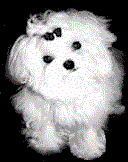
How To House Train A Poodle Puppy
House training a Poodle puppy requires consistency, patience, and positive reinforcement. In puppy parenthood, it's necessary to know how to house train a poodle puppy. These intelligent and eager to please breeds typically respond well to training but remember that each puppy is unique and progress can vary.
Start by establishing a consistent training routine to give your Poodle puppy a sense of security and predictability. This could include scheduled feeding times, play times, and periods of relaxation. Next, frequent bathroom breaks are crucial - typically, a puppy can control their bladder one hour for every month of age, so adjust accordingly. Choose a specific outdoor spot for your puppy to use as their bathroom, as the scent will encourage them to go in the future.
It's important to keep an eye on your Poodle puppy for signs that they need to go, such as sniffing around or circling. When these signs are spotted, immediately take them outside. If accidents happen, clean up thoroughly to eliminate the scent, avoiding punishment and rather reinforcing correct behavior with praise and treats.
Potty training a puppy like poodles, whether it's an adult poodle, young puppy, miniature poodles, and many more, is an important period of learning and adjustment for both of you. Your Poodle puppy will appreciate your understanding and guidance.
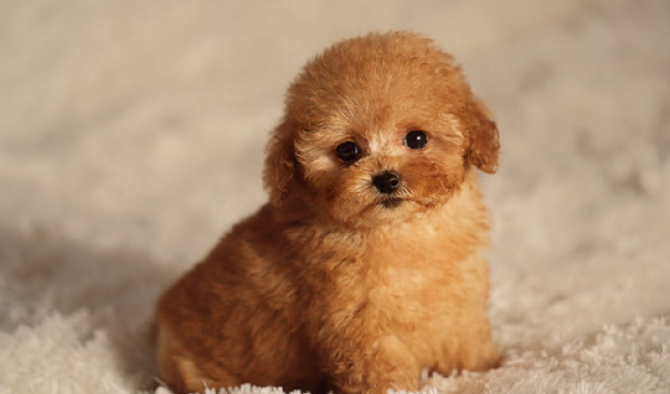

Understanding Your Poodle
Intelligence
Poodles are renowned for their intelligence, ranking among the top breeds in terms of trainability. This makes them highly adaptable to their owners' lifestyles and capable of learning a wide variety of commands and tricks. Their innate intelligence also means they require mental stimulation, making them an engaging and active companion.
Hypoallergenic
Poodles have a hypoallergenic coat, which is a boon for people with allergies. Their curly hair is more like human hair than dog fur, which means they shed less dander-the cause of most pet allergies. This makes them an excellent choice for households with allergy sufferers.
Versatility
Poodles come in a variety of sizes (standard, miniature, and toy), making it possible for potential owners to choose the perfect fit for their living situation and lifestyle. Regardless of size, all Poodles share the same general temperament and intelligence.
Longevity
Poodles have a relatively long lifespan compared to other dog breeds. On average, a Poodle can live between 12 to 15 years, which means more years of companionship and love.
Active Lifestyle
Poodles are energetic and love to play, making them the perfect fitness partner. Whether it's a game of fetch, a run in the park, or a swim in the pool, a Poodle is always ready for action. This active lifestyle can encourage owners to stay fit and healthy, too.
Strong Bonding
Poodles are known for forming strong bonds with their families. They are loyal and affectionate, thriving on the love and attention they get from their owners. This strong bond can bring a lot of happiness and emotional fulfillment to a Poodle owner's life.
Lastly, Poodles are simply beautiful dogs, with an elegant bearing and a proud demeanor. Their unique coat can be groomed in a variety of styles, allowing for a bit of fun and creativity. Owning a Poodle is not just about having a pet-it's about having a companion, a family member, and a friend.
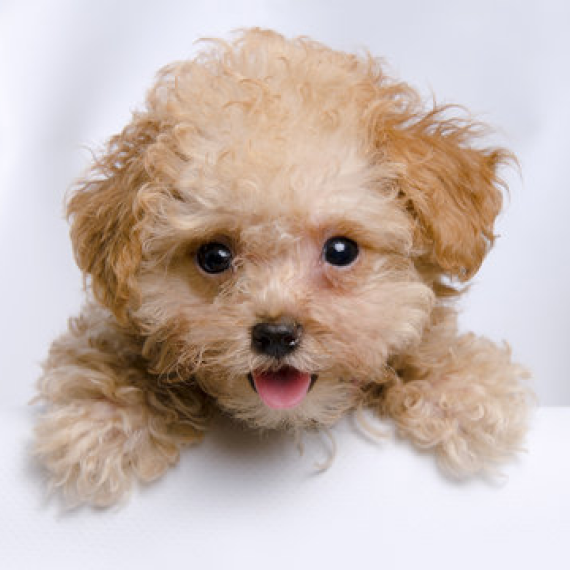
Behavioral Traits Unique to Poodle Puppies
Young puppies like Poodle puppies exhibit several unique behavioral traits that set them apart:
Early Intelligence
Even in puppyhood, Poodles show signs of their renowned intelligence. They are quick to learn and are typically more advanced in their potty training or house training progress compared to other breeds at the same age.
High Energy
Poodle puppies are full of energy and require plenty of playtimes. They are curious and love to explore their surroundings, making interactive toys a great choice.
Social
Poodle puppies enjoy being the center of attention and are very sociable. They typically get along well with other animals and humans alike, but socializing them from a young age is crucial to ensure they grow into well-rounded adults.
Sensitivity
Poodle puppies are often sensitive and can be quite intuitive to their owner's emotions. It's important to use positive reinforcement techniques when potty training them as they can be easily discouraged by harsh words.
Barking Tendency
Some Poodle puppies can be quite vocal. Early training and socialization can help control excessive barking.
The Potty Training Process for Poodle Puppies and What You Need to Prepare
The potty training process for Poodle puppies is a crucial part of their early development and requires a well-structured plan. Start potty training by purchasing the necessary supplies. You will need a crate that is the appropriate size for your Poodle puppy - small enough to discourage them from using one corner as a bathroom, but large enough for them to stand, turn around, and lay down comfortably. You may also need puppy pads, especially for the first few days or weeks. These are helpful for night time and when you can't take your puppy outside frequently.
The potty training process should follow a routine. Feed your puppy at the same times each day and take them outside immediately after each meal. Take them out again every 30 minutes to an hour, as well as after naps and play sessions. Always take them to the same spot, as the scent will encourage them to go.
When your puppy successfully goes potty outside and displays good behavior, shower them with praise and rewards. This will reinforce the behavior and encourage them to repeat it. If your puppy has an accident indoors, don't punish them - instead, clean it up thoroughly to remove the scent and continue with the routine.
Remember, consistency is key. Poodle puppies are smart and eager to please, so with a regular routine and plenty of positive reinforcement, they should pick up on potty training quickly. However, every puppy is different, and it's important to be patient and understanding during this process.
Implementing Positive Reinforcement
Reward-based training
Reward-based training, also known as positive reinforcement, is vital in shaping your Poodle puppy's behavior. This method involves rewarding your puppy for displaying good behavior, thereby increasing the likelihood of it being repeated. Rewards can range from treats, toys, praise, or even a combination of these.
When using this method, ensure that the reward is given immediately after the desired behavior is exhibited. This instant response helps your puppy associate the behavior with the reward. Additionally, remember to keep training sessions short and enjoyable to prevent your puppy from losing interest. One of the significant benefits of reward-based training is that it strengthens the bond between you and your puppy. It fosters trust, and your Poodle puppy learns to associate you with positive experiences, reinforcing your position as their guide and companion.
Timing of rewards
The timing of rewards in positive reinforcement training is crucial. Ideally, the reward should be given immediately after the desired behavior is exhibited. This immediate reinforcement helps the puppy make a clear association between their action and the positive consequence, thereby encouraging them to repeat the behavior. Rewards that are delayed may not have the same effect, as the puppy may have difficulty relating the reward to the specific behavior. Therefore, swift reward delivery is key to successful reward-based training. Consistent and timely rewards will significantly enhance your Poodle puppy's learning and development.
Using treats effectively
Using treats effectively is an essential part of positive reinforcement training. Treats should be small, easily consumable, and something your Poodle puppy finds delicious. High-value treats-those your puppy finds particularly enticing-can be reserved for training new skills or reinforcing behavior in challenging situations.
Remember, treats should be given immediately following the desired behavior. The timing is crucial for your puppy to make the connection between their action and the reward.
Also, it's important to use treats sparingly to avoid overfeeding your puppy. Treats should make up no more than 10% of your puppy's daily caloric intake to ensure a balanced diet. Lastly, always mix up the types of treats to keep your puppy interested and motivated during training sessions. Variety can make the training process more engaging for your puppy, increasing the chances of success.
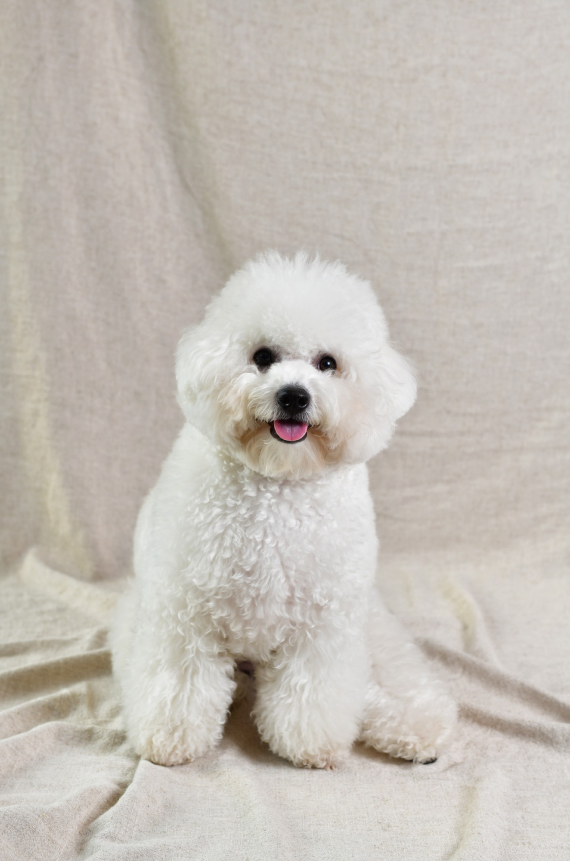
Incorporating verbal praise and affection
In addition to treats, incorporating verbal praise and affection as rewards plays a significant role in your Poodle puppy's training process. These forms of reward foster an emotional connection between you and your puppy, building trust and reinforcing desirable behavior. When your puppy exhibits positive behavior, immediately respond with enthusiastic verbal praise such as "Good job" or "Well done". Accompany this with physical affection, like petting or belly rubs, to further reinforce the positivity of their action.
More Tips in Successful Potty Training
Establish a Regular Feeding Schedule
One of the most effective ways to potty train your Poodle puppy is to establish a regular feeding schedule. Puppies typically need to relieve themselves after eating, so feeding your puppy at consistent times each day can help predict when they'll need to go. Avoid feeding your puppy close to bedtime to prevent accidents during the night.
Create a Designated Potty Area
Creating a designated potty area can help cue your puppy where to do their business. Whether it's a specific spot in your backyard or a potty pad in a particular room, consistently guiding your puppy to this area when it's time to go can help reinforce where they should relieve themselves.
Use a Cue Word or Phrase
Using a cue word or phrase like "Go potty" can help signal to your puppy that it's time to relieve themselves. Be sure to use the cue each time they're in the act of going, and eventually, your puppy will associate the word with the action.
Keep Potty Breaks Consistent
Consistency is key in potty training. Puppies usually need to go after eating, playing, or waking up from a nap, so be sure to take your puppy out during these times. Additionally, puppies typically can't hold their bladders for long, so they'll need frequent breaks.
Clean Accidents Thoroughly
Accidents are inevitable during potty training. When they occur, clean the area thoroughly to remove any lingering odors that might attract your puppy back to the same spot. Remember, patience and positivity are essential during this learning process.
By implementing these tips and remaining consistent, your Poodle puppy will be well on their way to becoming potty trained. Remember, every puppy is unique, and the training timeline may vary. Stay patient and keep the experience positive for both you and your puppy.
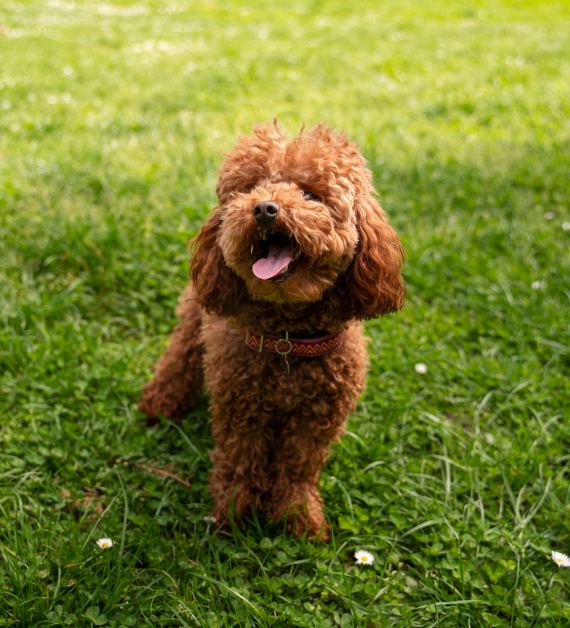
Indoor and Outdoor Training for Your Poodle Puppy
Indoor and outdoor training play a vital role in your Poodle puppy's overall development. Indoor training focuses on teaching your puppy house rules, such as where to eat, sleep, and potty. It's also where you can establish boundaries, like which areas are off-limits and how to behave when guests visit.
Outdoor training, on the other hand, is more about socialization and exercise. It's crucial for your puppy to interact with different environments, people, and other animals. This helps them develop confidence and adaptability. Regular outdoor exercise is also essential for your Poodle puppy's physical health and wellbeing.
Both indoor and outdoor training require patience, consistency, and positive reinforcement. Make each training session a positive experience for your puppy, and they'll grow into a well-behaved, sociable, and healthy dog.
How Long Does It Take to Train a Poodle?
The timeline for training a Poodle varies depending on the individual dog and the type of training. Basic obedience training, which includes commands like "sit," "stay," and "come," typically takes a few weeks to a few months. More complex skills, such as leash training or tricks, may take several months to master. Potty training a Poodle puppy usually takes 4-6 months, but it could be longer if the training is inconsistent.
Training a Poodle is a continuous process that evolves as your dog matures, so patience and consistency are key. Remember, every Poodle is unique, and it's essential to progress at a pace that's comfortable for your dog, ensuring each new skill is well ingrained before moving on to the next.
